Redlight Reckoning
Back to Contents of Issue: February 2004
|
|
|
|
by Leo Lewis |
|
|
Until late November 2003, the Blackman family had not been back to Japan for more than two years. As they took their first steps into the Miura beach cove they were hit by the horror of what had taken place there. Tim and Sophie lit a candle and laid flowers at the mouth of the cave where Lucie's head was found encased in concrete.
"It was very sad coming back, and just seeing the place where they found her," said Tim, his voice trailing off. "It had really been preying on my mind, and I think it just hit home to be on this beach again. The emotions take you by surprise sometimes. I just cried."
The experience also hardened the Blackmans' resolve to see justice done for Lucie. "Coming here and feeling close to her again reminds us in our hearts why we are doing this, why we should bother to come all this way from Britain. It has added to our determination to see this thing through to the end," said Tim.
Their four-day visit was an emotional roller-coaster as they tearfully retraced Lucie's last known steps along the Japanese coast and faced her alleged rapist and killer, Joji Obara, in court for the first time. But the feisty family described the trip as "empowering," and is now more determined than ever.
"This trip has been so difficult at times, but so successful," said Tim on the eve of his return to Britain. "There has been much less turmoil and I am not carrying the mind-numbing shock I was three years ago. I'm sharper and more focused now on what I have to do. There were ghosts that were lurking and they have been done away with."
Sophie reflected her father's words: "There are no more 'firsts' for us now, so there is a big sense of relief. We have seen Obara for the first time, come back to Japan for the first time since taking Lucie home, and been in court for the first time."
As they left Japan on the night of November 25, Tim vowed to return soon. If 50-year-old property developer Obara is found guilty, Tim may even have to go through the ordeal of describing his family's trauma to the Tokyo district court before the judges decide on a sentence.
Neither Tim, 50, nor Sophie, 23, Blackman has been back to Japan since March 2001 -- the grim day that the seven-month search for Lucie ended, and they were finally able to take her remains back to the UK.
Before leaving his home on the Isle of Wight, Tim admitted to being "very frightened" by the prospect of returning to Japan -- a place he described as "full of friends, but also very difficult to go back to."
The Blackmans' behavior at Miura beach was significant. Journalists who have covered Lucie's case from the beginning have always been struck by the family's reactions to each event as it has unfolded, particularly Tim's. In public at least, his persona has been one of determination mixed in with a measure of self-protecting gallows humor. Japanese interviewers have not always understood that, and have often asked their colleagues from the British press about when they can expect to see a more familiar set of emotions. On his latest trip to Japan, it initially seemed that Tim had not changed that persona much at all. He and Sophie cracked the occasional joke, and he voluntarily went out for dinner in Roppongi on all the nights he was in Tokyo. On the surface it seemed that the family's clearly successful method of dealing with their loss was still working.
But the scene at the beach was different. For the first time on their visit -- and perhaps ever -- the family was provided with an opportunity for private reflection about what had happened in the very location where it all mattered. Suddenly, this was no longer a family that had stirred up the Japanese press, shaken the Japanese police and exposed the dark side of Roppongi for what it was. This was a sad family that has been battered by the incomprehensible and still not finished grieving.
Accompanied by his partner, Josephine Burr, Tim took Sophie over to a rock along the beach where the three sat down and cracked open a bottle of champagne. With Mount Fuji visible across the bay, the family took its time chatting about Lucie and toasting her memory. In what has now become a family tradition, they were careful to leave a quarter of the bottle un-drunk, and placed it on the shrine with the flowers.
Their morning on the beach was in stark contrast with the last time Tim Blackman was there. Back in 2001, the small cove was overrun with hundreds of TV cameras, whose intrusion on the scene infuriated the Blackman family. But this time, the family appreciated the calm of the place for the first time.
"I am amazed at how different this place is today from the way it seemed three years ago," said Tim. "It's strange how the memory plays tricks: We all remember this place as very crowded and noisy, but it isn't like that now. It's greener, more private and more special. It feels like a proper place to come and remember Lucie now. Coming here had really been weighing on my mind, but I feel that weight has been lifted now."
The Blackmans then traveled further down the Japanese coast to the town of Zushi, visiting another apartment building where Obara is alleged to have lured girls before plying them with alcohol or drugs, raping them and capturing his crimes on camera. According to Japanese prosecutors in the case, it was at Zushi marina that Lucie was last seen alive, and the area has become another deeply emotional site for the Blackman family.
It was there, say prosecutors, that Obara was spotted by a caretaker -- the same one who was giving evidence to the Tokyo district court on the day the Blackmans visited. One of Tim Blackman's main reasons for making the trip back to Japan was to witness for himself the Japanese legal process in action. As he discovered, it runs notoriously slowly. Obara is being charged with a string of other rapes, in addition to murdering Lucie and dismembering her body.
Tim and Sophie were desperate to hear the plethora of tiny yet telling details being given by witnesses in the case, and bitterly regret that they cannot sit in on every hearing. "These evidence hearings keep throwing up little details that are so precious to us," said Tim. "Stuff that seems so small and unimportant to others is fascinating for us because it gives us that final picture of Lucie. If someone mentions something like a bag or a car, we just want to hear everything about it."
Japanese legal experts believe that, like so many high-profile Japanese cases, the trial of Obara could drag on for years before a verdict is finally reached.
Japanese court rules also mean that the most recent picture of Obara that the Blackmans had seen before their visit was taken when he was a student in his 20s. When he was led by a rope into the courtroom, Tim and Sophie, sitting just a few yards from him, strained to see his face, but he slouched down behind a huge pile of legal notes and avoided their eyes throughout the 2-and-a-half-hour hearing. Obara was dressed in a double-breasted suit and wore tinted glasses the entire time. As he has on other occasions, Obara shuffled non-stop with his papers and kept mopping his face with a small blue towel.
Tim afterwards said that he thought he had seen Obara glancing round from behind his notes. As the hearing proceeded, Sophie sketched Obara's face on a piece of scrap paper. "I was expecting to be nervous, but we feel really empowered because the trip has made us more knowledgeable about how it all works," said Tim. "Rather than anger or bitterness, we just feel determined to see this through now. We want to make sure that Lucie's life was not wasted."
On their first night in Tokyo, the Blackman family also visited Geronimo's bar in Roppongi. The last time they had been there was during the months spent desperately searching for Lucie. Like so many ex-pat bars, the walls are covered with trophies and mementos of drunken nights out. In Geronimo's, one wall displays a montage of hundreds of photographs taken in the bar, while another serves as a pin-board for hundreds of little brass plaques naming those hardy enough to down twenty shots of spirits in a single night.
Within moments of arriving in the crowded bar, Sophie had elbowed her way across to the photographs and stood examining each one minutely. Like everyone who has suffered a loss, the Blackmans are saddened by the fact that their collection of Lucie pictures is limited by her shortened lifespan. The promise that perhaps, lurking on that wall, might have been a picture of her they had never seen provided yet more evidence of how deep their grief remains.
In the face of strict instructions from the club's owners to say a bare minimum, Nishi took the initiative and offered the Blackman family as much help as he could. He helped organize the search, and, at the stage before they knew Lucie was dead, offered a rich series of leads for how she might be tracked down. After her death, he even took the trouble to fly to Britain and pay his respects at Lucie's grave in the small village where she is buried. His acts of kindness were rewarded with a summary dismissal from the club.
Although the Blackman family has done a great deal to focus the attention of the world on Roppongi, the hostess industry and the unspoken dangers of a society that runs largely on blind trust, Tim and Sophie do not pretend to be crusaders for a wider cause. They understand perfectly that girls arriving in Japan should be alert to the dangers, and bitterly resent the idea that a rapist and killer should have gone unnoticed for such a long time. But their mission centers on Lucie, and they have resigned themselves to the fact that Roppongi has, if anything, become a more dangerous place for a hostess than it was two years ago.
"Within a few years, there will not be any hostesses left," he says. "It may have been a job that occasionally led to other things, but basically a good hostess should be like a geisha -- it is all part of the ethos that a good night out should involve a bit of refinement and a bit of class. But the girls don't want to take the risk any more and the customers have different ideas about how they want to spend their money. All the girls that would have become hostesses five years ago are now becoming strippers -- the same sort of money but half the risk and half the effort."
It was not hard to see why the Blackman family might despair of making a difference. As they sat at dinner, they spotted a copy of one of Tokyo's free weekly English-language classified magazines. Leafing immediately to the back, they perused the pages of low-rent advertisements until their eyes fell on the "help wanted" section. There, in bold type, was a listing for the very same club from which Lucie had been abducted, advertising hostess positions for young, willing and "attractive European women." @ |
|
Note: The function "email this page" is currently not supported for this page.


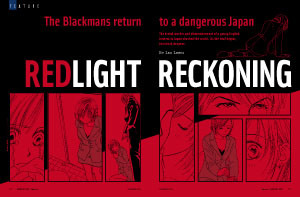 THE FATHER AND SISTER of Lucie Blackman, the ex-British Airways flight attendant who was abducted and slain in Tokyo three years ago, broke down in tears as they returned to the secluded beach where her mutilated body was found.
THE FATHER AND SISTER of Lucie Blackman, the ex-British Airways flight attendant who was abducted and slain in Tokyo three years ago, broke down in tears as they returned to the secluded beach where her mutilated body was found.
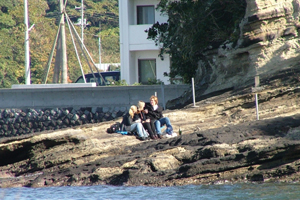 Scenes of the crime
Scenes of the crime
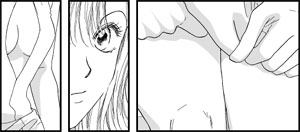 Face to face
Face to face
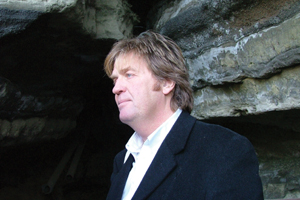 Riskier Roppongi
Riskier Roppongi
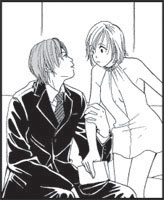 The night in Geronimo's served up an unexpected surprise for the family. The chief bartender, Nishi (he preferred not to give his full name), greeted the family with warmth and turned out to have been a central player in the drama that followed Lucie's disappearance. He was a manager in the hostess club where Lucie worked, and was hit hard by the grim sequence of events that led to the eventual discovery of her body.
The night in Geronimo's served up an unexpected surprise for the family. The chief bartender, Nishi (he preferred not to give his full name), greeted the family with warmth and turned out to have been a central player in the drama that followed Lucie's disappearance. He was a manager in the hostess club where Lucie worked, and was hit hard by the grim sequence of events that led to the eventual discovery of her body.
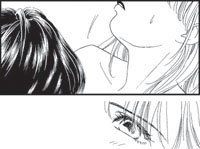 They asked Nishi whether he thought the place had changed much, to which he shook his head sadly. He, like many seasoned observers of Japanese entertainment culture, takes the view that the quirks that once made Japan so interesting and unique are unable to stand up to the realities of the new norms. Japanese society, he says, is less trusting and has become more concerned with immediate pleasure than the sort of long-term entertainment that produced the hostesses and the clubs they worked in. Nishi firmly believes that the Japanese adult entertainment industry will increasingly clone adult entertainment industries elsewhere in the world -- tending at all stages of development to satisfy the lowest common denominator.
They asked Nishi whether he thought the place had changed much, to which he shook his head sadly. He, like many seasoned observers of Japanese entertainment culture, takes the view that the quirks that once made Japan so interesting and unique are unable to stand up to the realities of the new norms. Japanese society, he says, is less trusting and has become more concerned with immediate pleasure than the sort of long-term entertainment that produced the hostesses and the clubs they worked in. Nishi firmly believes that the Japanese adult entertainment industry will increasingly clone adult entertainment industries elsewhere in the world -- tending at all stages of development to satisfy the lowest common denominator.



